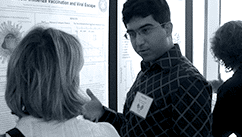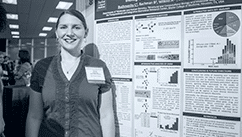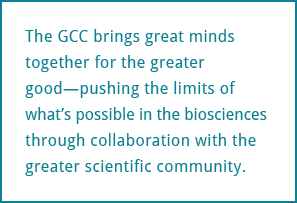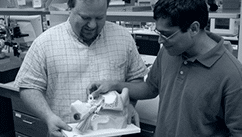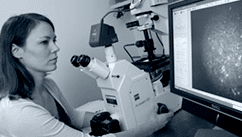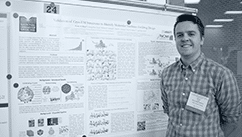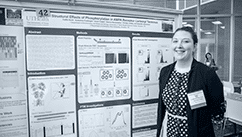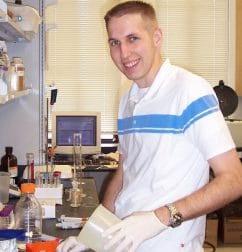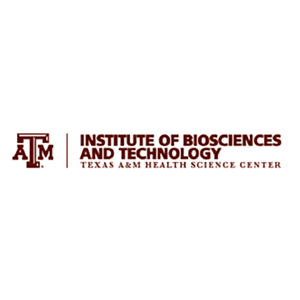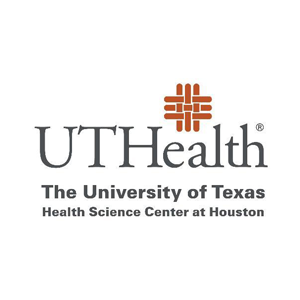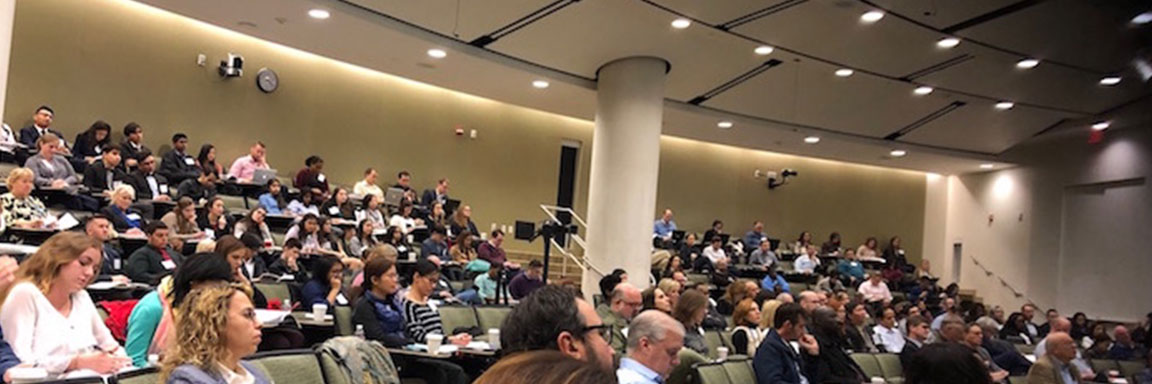
Houston Area Molecular Biophysics Training Program (HAMBP)
Providing a unique, inter-institutional biophysical training experience with leading institutions and the latest technology
(Funded by the National Institutes of Health grant T32GM008280 to Baylor College of Medicine)
The next Call for Predoctoral Applications will be in Spring 2020.
Program Director:
Theodore Wensel, PhD, Professor
Molecular Biology & Biochemistry Baylor College of Medicine
Program Administrator:
Vanessa C. Herrera
Assistant Director Keck Center Training, Gulf Coast Consortia
The inter-institutional nature of the HAMBP program provides a rich variety of biophysical training with ready access to state of the art resources and leading scientists at Baylor College of Medicine, Rice University, University of Houston, University of Texas Health Science Center at Houston, University of Texas M. D. Anderson Cancer Center and University of Texas Medical Branch at Galveston.
Specific research areas include: mass spectrometry, cryo-electron microscopy, raman spectroscopy, NMR of proteins and nucleic acids, X-ray crystallography, rapid kinetics, computational biology, digital imaging, fluorescent spectroscopy, protein engineering and membrane biophysics.
Trainee Eligibility
PhD students from Baylor College of Medicine, Rice University, University of Houston, University of Texas Health Science Center at Houston, University of Texas M. D. Anderson Cancer Center and University of Texas Medical Branch at Galveston are eligible to apply.
- Students must be US citizens or Permanent Residents.
- Students must select a mentor from the HAMBP Training Faculty.
The Gulf Coast Consortia is committed to providing equal opportunity in training for individuals with disabilities and individuals from racial and ethnic groups who are currently under-represented in STEM fields. We welcome applications from all qualified trainees, regardless of ethnic/racial status or disability status. All GCC member institutions are ADAAA compliant and have offices of disability support services that provide accommodations and support services to trainees, faculty, staff, and visitors.
Current Trainees
HAMBP Fellowship Application
IMPORTANT: Please Review Eligibility Criteria above prior to completing an application.
- Application deadline: Friday, May 31, 2019
- Application Decisions by: July 31, 2019
- Fellowship Start Date*: July 1, 2019 (*Tentative Start Date)
FELLOWSHIP BENEFITS AND REQUIREMENTS In addition to receiving up to three years of financial support, Trainees and Mentors agree to participate in HAMBP activities and meet program requirements. These include course requirements (one semester of graduate level Molecular Biophysics, plus two elective courses); attending weekly seminar series (in person or remotely); completing an approved course in the responsible conduct of research (research ethics); attend monthly trainee meetings during the academic year; attend a yearly research symposium and progress review; inclusion of one or more HAMBP mentors in addition to the major advisor on the thesis committee; yearly meetings with the HAMBP director until graduation; attendance and poster presentation at the Keck Center Annual Research Conference and the Sealy Center Structural Biology Center; research presentation at the Biophysical Society or similar national or international meeting; completion of at least three career development classes, seminars, or workshops over a 3-year period; acknowledgment of training grant support in publications and presentations; and keeping Keck Center informed of career developments after graduation.
APPLICATION INSTRUCTIONS
(NOTE: Application form will not open in Chrome unless you’ve disabled Chrome’s built-in PDF viewer in your settings.) IMPORTANT: You must contact your Institutional Representative from the list of HAMBP Steering Committee members pictured below prior to completing an application. The applicant or the applicant’s mentor should reach out to the designated Steering Committee member at the applicant’s institution to discuss the applicant’s background and project prior to completing an application. This step is a verified component of the HAMBP Training Application form.
Complete and submit the HAMBP Training Application form via email to Vanessa Herrera at herrera@rice.edu.
Please be certain to fill out the application COMPLETELY: you must provide GRE and/or MCAT scores as well as undergraduate and graduate GPA.
Complete and submit the Project Information document* (word or pdf format) via email to Vanessa Herrera at herrera@rice.edu, and include the following sections:
– Project Description (max 1,000 words)
– Layperson’s Project Description (max 250 words)
– Career Goals (max 500 words) – Mentoring Plan (max 400 words)
– Grant Support *Please see full list of detailed requirements for this document in the HAMBP Training Application form
Mentor must submit Mentor Recommendation Letter via direct email to Vanessa Herrera at herrera@rice.edu. Only ONE mentor is required for the HAMBP program although dual mentorship is welcomed. This letter should evaluate the applicant in terms of his/her suitability for a research career in molecular biophysics and should specifically address the following areas:
– Scientific background and prior training
– Research experience and skills
– Quantitative skills, aptitude and training
– Work ethic
– Communication skills
– Ability to work with others
– Mentor’s approval of applicant’s Mentoring Plan
Secure two Letters of Recommendation from people other than your mentor. Recommenders should submit their letters directly to Vanessa Herrera.
Submit Transcripts from all undergraduate and graduate coursework (Official preferred, Unofficial accepted) to Vanessa Herrera.
Submit a current resume (CV) outlining your professional work experience and history to Vanessa Herrera.
***Please Note: All application materials, including all three required recommendation letters, must be RECEIVED by Friday, May 31, 2019.
The Gulf Coast Consortia (GCC) administers this program. The GCC is committed to providing equal opportunity in training for individuals with disabilities and individuals from racial and ethnic groups who are currently under-represented in STEM fields. We welcome applications from all qualified trainees, regardless of ethnic/racial status or disability status. All GCC member institutions are ADAAA compliant and have offices of disability support services that provide accommodations and support services to trainees, faculty, staff, and visitors.
HAMBP Program Administrator:
Vanessa C. Herrera, Assistant Director Grant Programs
6100 Main St., MS-141 Houston, TX 77005
Tel. (713) 348-4752; Email: herrera@rice.edu
|
Dr. Theodore Wensel, Program Director |
Dr. B.V.V. Prasad |
|
Dr. Edward Nikonowicz |
Dr. Yizhi (Jane) Tao |
|
Dr. Margaret Cheung |
Dr. Vasanthi Jayaraman |
|
Dr. Alemayehu (Alex) Gorfe |
Dr. B. Montgomery Pettitt |
|
Dr. Thomas Smith |
The requirements of a HAMBP trainee are: (1) Complete the graduate Molecular Biophysics course at Baylor College of Medicine (GS-SB-408) or Rice University (BIOC 551). UTMB trainees have the option of substituting BMB 6332 (Molecular Biophysics I); (2) Attend weekly Molecular Biophysics seminars every semester (example: Friday afternoon Keck Seminar Lecture Series); (3) Obtain advanced training by taking at least one additional full semester graduate course or two short-term courses in molecular biophysics (consult with Program Director for course approval). A minimum grade of ‘B’ or ‘Pass’ is required; (4) Complete an approved course in the responsible conduct of research (research ethics); (5) Attend the annual Biophysical Society Meetings or a similar national research meeting (partial travel support will be available); (6) Present a poster at the Keck Center Annual Research Conference (held annually in the Fall) and the Sealy Center for Structural Biology Symposium held annually each spring. (7) Attend the 5-hr Rigor and Reproducibility workshop offered twice a year and one of the more targeted 4-hour modules (Dates, TBD). (8) Attend monthly trainee meetings held the 1st Friday of the month (Sept. – May) at 3:00pm in the BRC bldg. (9) Submit a written progress report and present at the HAMBP progress review held annually in the Summer (mentors are expected to attend). (10) Complete or participate in at least three career development classes, seminars, or workshops over a 3-year period.
Inter-Institutional and Graduate School links:
RU Inter-institutional Graduate Student Enrollment
Responsible Conduct of Research requirement: As the HAMBP training program is funded by the National Institutes of Health (NIH), per NIH regulation NOT-OD-10-019 all trainees must take an approved Responsible Conduct of Research course at the graduate school level. Even if the trainee has taken an ethics course while an undergraduate, or an online course such as from CITI, the trainee must still take a course at the graduate level (online courses by themselves do not fulfill NIH requirements). Trainees must provide the GCC with a transcript or certificate as proof of completion.
The following are approved Responsible Conduct of Research courses:
1. BCM: Grad 513 Science as a Profession
2. UTHSC-H: GS1 10051 The Ethical Dimensions of the Biomedical Sciences
3. Rice University: UNIV 594 Training in the Responsible Conduct of Research; formerly called BIOS/BIOE 594
4. UTMB: MEHU 6101 Ethics in Scientific Research.
